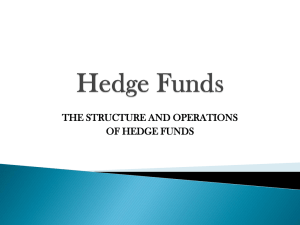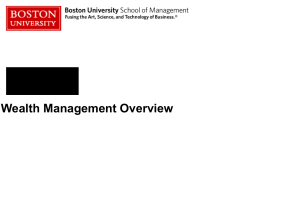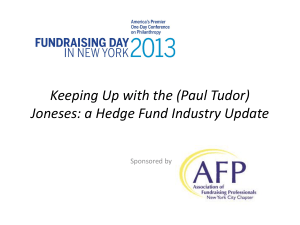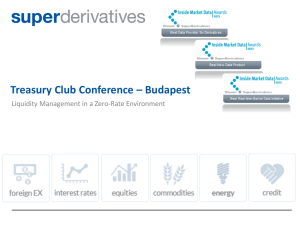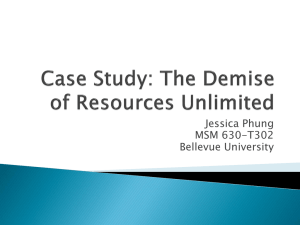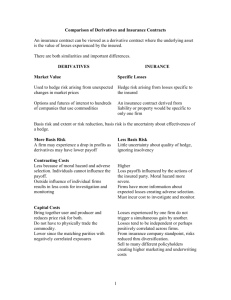Selling To Prospects Who Don't Already Know You
advertisement
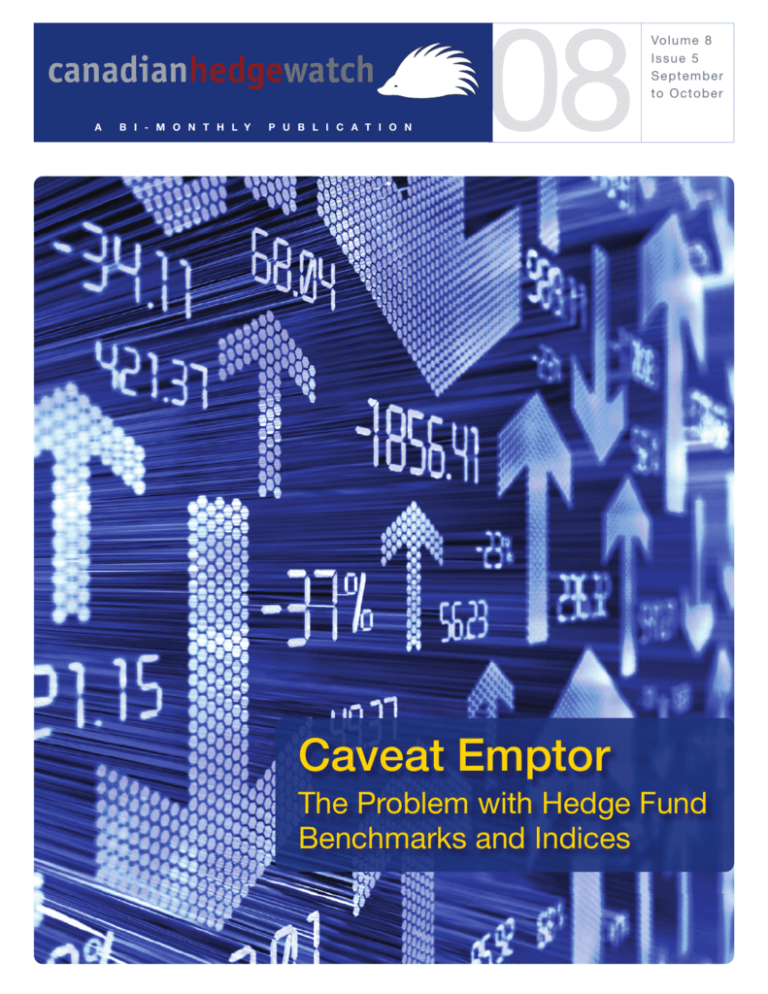
A B I - M O N T H L Y P U B L I C A T I O N 08 Volume 8 Issue 5 Sep tember to October Caveat Emptor The Problem with Hedge Fund Benchmarks and Indices 08 Performance Summary Sept 2008 CHW HEDGE FUND INDICES (CHW-HF) Aug 2008 C O N T E N T S YTD % -8.88 -2.32 -15.99 Caveat Emptor – The Problems with Hedge Fund Benchmarks and Indices -11.04 -2.51 -19.09 Philip Niles, Butterfield Fulcrum Group (Canada) Ltd. CHW-HF Notes Index -1.76 -0.76 -3.56 CHW-HF Fund of Funds Index -2.85 -1.62 -7.88 CHW-HF Composite Index CHW-HF Equity Hedged Index Scotia Capital Canadian Hedge Fund Index SC CDN HF Index Asset Weighted 11.17 -2.99 -12.73 SC CDN HF Index Equal Weighted 10.22 -1.89 -13.35 CSFB/Tremont Hedge Indices CSFB/Tremont Hedge Fund Index -6.55 -1.47 -9.87 Convertible Arbitrage -12.26 -0.66 -19.45 Dedicated Short Bias -6.08 -4.50 3.40 Emerging Markets -8.93 -4.00 -18.07 Equity Market Neutral -1.41 -0.59 1.67 Event Driven -5.75 -0.16 -9.31 Distressed -5.18 -0.07 -8.96 Event Driven Multi-Strategy -6.17 -0.20 -9.66 Risk Arbitrage -3.49 -1.16 -1.77 Fixed Income Arbitrage -6.80 -0.70 -11.57 Global Macro -6.63 -1.37 -2.07 Long/Short Equity -7.81 -2.11 -13.28 Managed Futures -0.57 -2.48 6.70 Multi-Strategy -7.35 -1.26 -12.62 Hennessee Hedge Fund Index -6.24 -0.79 -10.28 HFRI Fund Weighted Composite Index -5.25 -1.38 -10.11 GLOBAL HEDGE FUND INDICES An Interview with Allan Brown of Burlington Capital Management 2 4 Daryl Ching, Canadian Hedge Watch GAAP – Why Do We Need It and What Can You Do? 5 David Hiscock, CA Success Inc. Knowledge Processing as a Differentiator 6 Sankar Krishnan, Adventity Inc. Tight Credit, Falling Stocks a Lethal Mix 9 Mark Noble, Advisor.ca Hedge Fund Snapshot: Northern Rivers Innovation Fund LP 10 Hedge Fund Performance Tables 12 Selling to Prospects Who Don't Already Know You 22 Bruce Frumerman, Frumerman & Nemeth Inc. HFRI Equity Market Neutral Index -3.07 -1.31 -3.00 HFRI Fund of Funds Composite Index -5.76 -1.47 -11.82 Around the Hedge – A Review of Hedge Fund Happenings 24 MSCI World Index (C$) -11.79 2.52 -18.66 Those Evil Hedge Funds 27 MSCI World Index (US$) -11.85 -1.36 -23.85 Daryl Ching, Canadian Hedge Watch MSCI Emerg. Markets Free Index (C$) -17.44 -4.34 -30.97 MARKET INDICES Dow Jones 30 Industrial Avg. (US$) -6.00 1.45 -18.20 Funds of Funds Industry Growth Slows NASDAQ Composite Index (C$) -11.58 5.80 -15.76 InvestHedge NASDAQ Composite Index (US$) -11.64 1.80 -21.13 S&P 500 Total Return Index (C$) -8.85 5.43 -13.79 S&P 500 Total Return Index (US$) -8.91 1.45 -19.29 -14.66 1.31 -15.04 S&P/TSX Composite Index Volume 8 Issue 5 - September / October 2008 28 1 Selling to Prospects Who Don’t Already Know You Bruce Frumerman, Frumerman & Nemeth Inc. There are more hedge funds than there are stocks in the U.S. stock market. A Pertrac study released in March 2008 stated that there are 22,650 “distinct” hedge funds and fund of funds. Included in that number are 15,250 single manager hedge funds. While a little over 350 funds have more than $1 billion in assets under management, over 40% of the single manager funds continue to manage less than $25 million – a size that industry participants warned was too small to survive. While some of the new firms will prosper, many will not. So, what is it that enables one money manager to grow and retain assets while a competitor cannot? Is performance the sole answer? Of course not… if that were so, there would be but a fraction of the number of money management firms there are. While performance is a significant ingredient in the formula for success in attracting assets, it is just part of the equation. A money manager client who came to my firm for communications marketing help some years back, because he was having trouble attracting new investors, is a good example of this point. He had a top 1% ranked performance for two years in a row, delivering triple-digit returns. Prospects, however, did not understand his overly complicated explanation about what he did to get those returns and they were wary. Figuring out how to cogently explain the way he managed his portfolio to people beyond friends and family helped that manager grow assets 80% the following year, despite his significant drop in performance. So, for the money manager who thinks that stellar performance alone is all that’s needed, I say think again. As an institutional investor said in the financial trade press, “I am not going to buy a track record. I want to buy an investment process.” Remember that comment. Is access to distribution channels the key to success? That’s important, too, but just because a money management firm’s products are available through a distribution channel does not make demand pull exist for those products or mean that the channel is proactively soliciting for investors in the firm’s products. Marketing is the other major factor that impacts a money management firm’s ability to grow and retain assets. Marketing does more than “get the word out”. It’s what gives a firm its identity and positions it in the eyes of the marketplace of investors, advisors and the media. When marketing is diminished by a money management firm, its ability to attract and retain assets suffers. Many of your competitors are making a tactical error that you can turn to your advantage. While all have budgeted for legal and accounting, for research and for securities trading services, many did not budget for marketing! To them, marketing is an afterthought. And this, too, is part of the environment in which you’re competing today. What makes up a firm’s communications marketing? The storylines and language it uses in its verbal and written contacts with clients, prospects and those who influence them. Communications marketing is what is used to persuade people to buy into the investment products the firm is selling and the process it uses to manage money. This includes everything from verbal sales presentations and marketing collateral, to letters to investors and interactions with the press. Beyond Friends & Family Most hedge fund firm owners begin by having investors who are friends and family; people who already thought well of them and trusted them. Once they begin marketing to strangers, however, they often find themselves getting a colder reception. As one hedge fund firm owner confided in me, now that he has seen how tough it is to interest strangers in his fund and convert them into investors, he realizes that he could have recited Lewis Carroll’s ‘Jabberwocky’ to some of his friends and family investors and they still would have invested. They knew him and, in their minds, that was enough. Selling to institutions, family offices, fund of funds, endowments and foundations, High Net Worth investors and financial planning and investment advisory firms that invest on behalf of their clients, however, is another story altogether. Which audiences will your firm target? Be reasonable in your expectations. Not every category of investor is right for every fund at every stage of its growth. This sounds straightforward, yet it’s a common problem among hedge funds. I see this quite frequently. When hedge fund managers that contact my firm seeking communications and sales marketing help they explain to me what they have been doing to date in seeking to attract investors. Eight out of ten of them had been spending the bulk of their selling time pursuing the wrong type of investor. No wonder they struggle to grow their asset base. Also, which markets do you plan on selling to: just the Canadian marketplace or also to offshore investors? You’ll either find yourself competing in your own backyard against a relatively small but growing number of Canadian hedge funds, or you’ll be pursuing investors for your fund in the world market, competing against a much greater number of firms that may be bigger, older and have deeper pockets than you. In either case, today’s investors are more skeptical than those from years past, and selling to them is a time-consuming job. Who Will Sell Your Fund? If your hedge fund firm is ready to pursue prospects beyond friends and family, it’s time to begin thinking about having someone in addition to, or other than yourself, undertake your selling. For some hedge fund managers the answer is an in-house sales person; for others a Third Party Marketer can be a better solution. There are some important issues you should be thinking about before you look to recruit somebody to join your team, however. We’ll address these issues, along with some tips for getting the most out of your sales marketer, in my next column. So, you have to budget for marketing. And be aware that handling marketing right costs more than just money; it also costs you time and effort. Consequently you need to budget for that as well, provided, that is, you’re aiming to out-market your competition. Bruce Frumerman is president of Frumerman & Nemeth Inc. (www.frumerman.com), a New York-based communications and sales marketing consultancy that helps hedge funds out-market their competitors by doing a better job of educating and persuading people to understand and buy into how they invest. His firm’s work has helped money management clients attract over $7 billion in new assets. There are two parts to marketing: sales marketing and communications marketing. Sales marketing is the process of selling to prospects and their advisors. A salesperson or team, whether in-house, Third Party Marketers or broker/advisors, identifies prospects, makes contact, gives face-to-face presentations and manages follow-up throughout the selling cycle for turning prospects into investors. But what is it that the target audiences are told? That’s the matter of communications marketing. Mr. Frumerman has 28 years of experience in developing buyer-focused positioning strategies to differentiate money managers from their competitors; creating more cogent and compelling sales presentations and marketing materials to better tell their story throughout the selling cycle; and using media relations marketing to help establish a branded identity for their organization by generating third-party endorsement for the expertise of their people, the value of their services and the quality of their products. 22 www.canadianhedgewatch.com


